Miniature Poodle
Adobe Stock/VitCOM
When it comes to Poodles, there are a few different types:
- Standard Poodles are the largest, weighing 40–70 pounds.
- Miniature Poodles, full-grown, weigh 10–15 pounds.
- Toy Poodles are itty-bitty, at just 4–6 pounds.
Like their larger and tinier cousins, Miniature Poodles are an active and intelligent dog breed that loves to do tricks, go on long walks, and even swim alongside their humans. They pack a lot of energy into their small size.
Caring for a Miniature Poodle
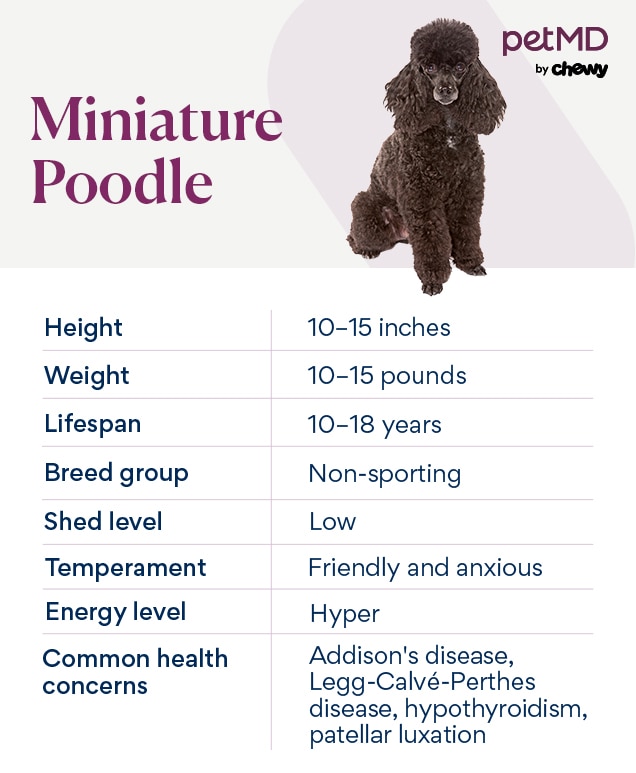
These small Poodles live a long time, typically 10–18 years. But these are no pocket pups: Miniature Poodles are small balls of energy and need lots of exercise.
Miniature Poodles are popular in part because of their low-shedding coat. While no dog is completely hypoallergenic, their curly fur (whether white, red, or black) can be a good match for some people with allergies. But that coat comes at a cost—literally—because Miniature Poodles need regular appointments with a professional groomer.
Miniature Poodle Health Issues
Poodles, including Miniature Poodles, are predisposed to a few health issues, according to the Poodle Club of America.
When looking for a Miniature Poodle puppy, ask your breeder about what health screenings your pup and the parents have gone through. If you’re adopting a Miniature Poodle, ask the rescue for all available health information.
Mitral Valve Disease (MVD)
Mitral valve disease, or mitral regurgitation, is a common heart condition in Miniature Poodles over 8 years old. When this valve leaks, not enough blood is circulated to the body. This causes heart enlargement and can also lead to congestive heart failure.
Some dogs don’t have any signs initially other than a heart murmur. Other dogs will have evidence of:
-
“Slowing down”
-
Exercise intolerance
-
Trouble breathing
-
Collapse
-
Weakness
While there is no cure for this heart condition, daily medications and routine checkups with your vet can help your Mini Poodle to live a long life.
Addison’s Disease
Addison’s disease is when the adrenal glands don’t produce enough corticosteroid hormones, which affects the dog’s metabolism and ability to manage stress. Without enough of these hormones, the smallest stressful situation can cause very serious health concerns—and even death.
Dogs with Addison’s disease may vomit, have a poor appetite, lose weight, and/or be lethargic. But if caught early, dogs with Addison’s disease can live long, healthy lives with lifelong medication and routine checkups with their veterinarian.
Dyschondroplasia
Dyschondroplasia is a hereditary skeletal disorder that can affect Poodles. Dogs with this disorder can have underdeveloped limbs, with symptoms that include:
-
Lameness
-
Limping
-
Stiffness
-
Lethargy
-
Pain
-
Difficulty moving
Legg-Calvé-Perthes
Legg-Calvé-Perthes disease is when the head of the dog’s femur breaks down, causing pain and limping. Young Miniature Poodles are susceptible to this condition, which can be managed with pain medications. But more often, dogs with Legg-Calvé-Perthes disease require surgical correction to live a normal, pain-free life.
Hypothyroidism
When a dog’s body doesn’t produce enough thyroid hormone, they have a condition called hypothyroidism. Symptoms of hypothyroidism in dogs include:
-
Excessive hunger
-
Lethargy
-
Excessive shedding
-
Slow heart rate
-
Coarse coat texture
-
Chronic ear and skin infections
Hypothyroidism is treated with lifelong oral medication, and dogs with this condition often live normally with proper treatment.
Patellar Luxation
A luxating patella is when a kneecap slips out of place. Patellar luxation is a common condition in small dogs, including Miniature Poodles.
If you see your Miniature Poodle holding a leg up, limping, or having problems walking, they may be experiencing patellar luxation. Veterinarians can treat this condition by moving the patellar ligament to the correct location through surgery.
In minor cases, this condition can be managed with anti-inflammatory and pain medications, but it will result in arthritis. Veterinarians may also suggest weight loss or joint supplements.
Eye Problems
Miniature Poodles can develop a few different eye conditions as they age. One is progressive retinal atrophy (PRA), which causes the eye’s retina to degenerate. This condition is not curable and will lead to blindness.
Cataracts are a hereditary condition that affects Miniature Poodles. Cloudy eyes are a telltale sign of cataracts, and you might notice your dog bumping into things and having issues navigating their environment, especially at night. But unlike PRA, cataracts can be corrected with surgery before your dog loses sight.
What To Feed a Miniature Poodle
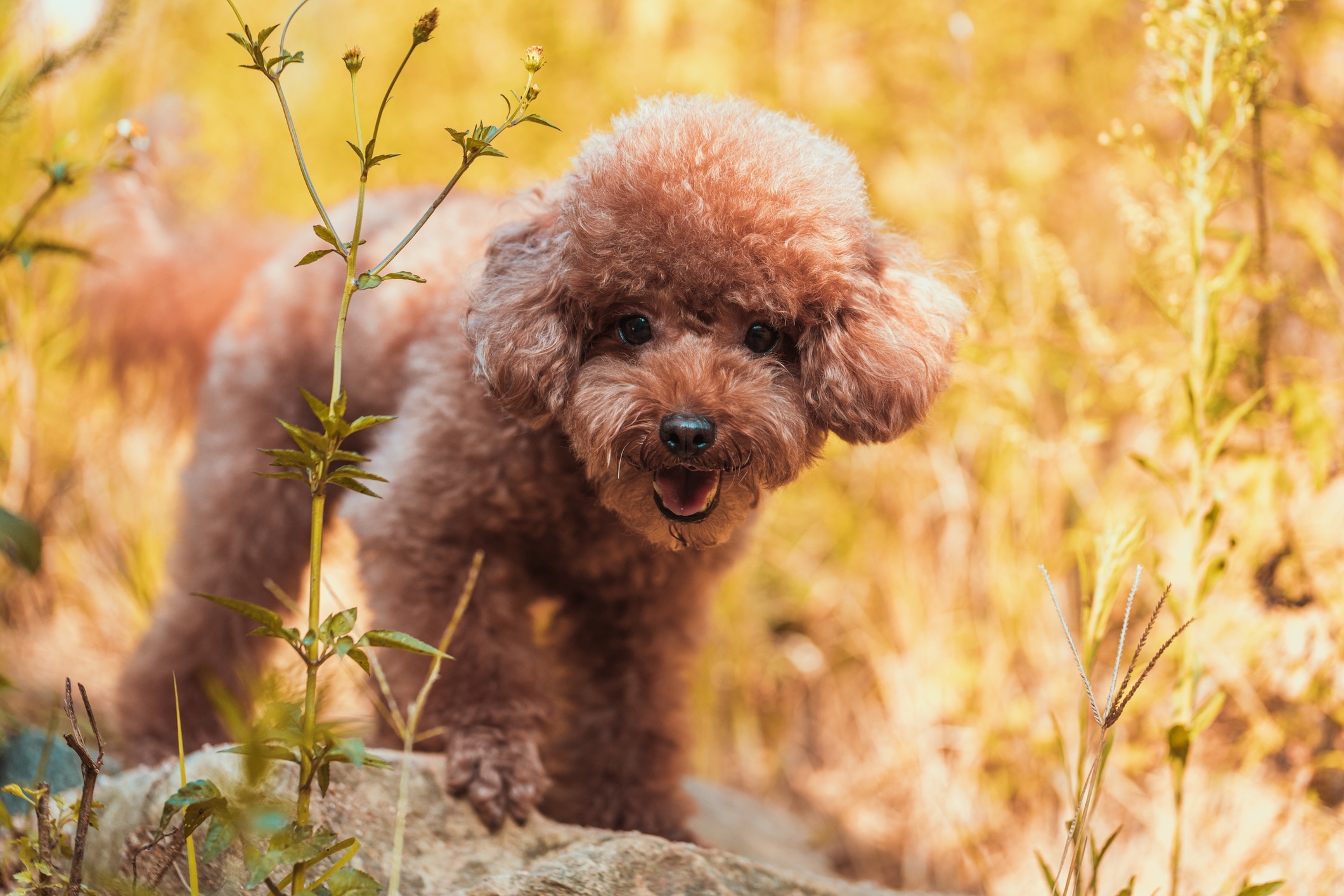
Miniature Poodles should eat a dog food approved by the Association of American Feed Control Officials (AAFCO). Their food must be appropriate for their current life stage (puppy, adult, or senior). Your veterinarian can recommend specific brands and help you make sure your Mini Poodle is getting the nutrients they need.
How To Feed a Miniature Poodle
Miniature Poodle puppies need to eat three or four times every day, adhering to a consistent schedule. Once they reach their first birthday, you can reduce their meals to twice a day.
How Much Should You Feed a Miniature Poodle?
The best way to know how much to feed your dog is to talk to your veterinarian. Your Miniature Poodle’s daily calories will depend on their current body condition score and weight, activity level, and health history.
You can also turn to your dog food packaging for guidance, as it will give you an amount to feed your pup based on their ideal weight.
Nutritional Tips for Miniature Poodles
As long as your pup is eating a well-balanced diet, they shouldn’t need nutritional supplements. But because Miniature Poodles can have problems with their hips and knees, your veterinarian might prescribe supplements to improve joint health.
Behavior and Training Tips for Miniature Poodles
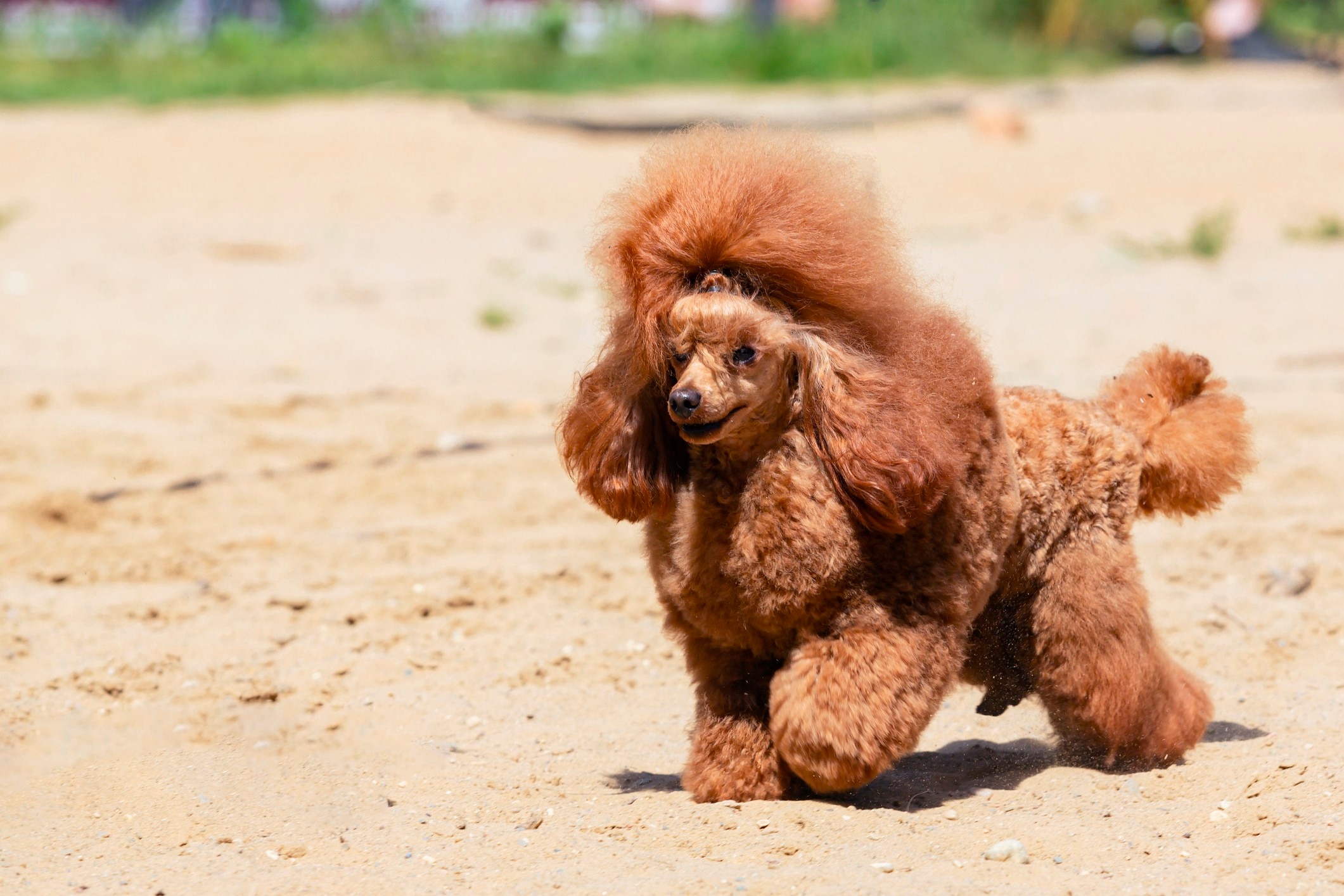
Miniature Poodles are small, social, and energetic. Like all dogs, Miniature Poodles need obedience training and socialization, but they are fast learners and eager to please their people. Because of this, Miniature Poodles can do well in many types of homes.
Miniature Poodle Personality and Temperament
Miniature Poodles usually get along well with other pets. And because they’re so friendly and playful, they make great companions for children. They need lots of exercise and playtime to burn off energy and keep their sharp brain engaged.
Miniature Poodles can become anxious in new situations, however, so early socialization and training is important for having a confident pup.
Miniature Poodle Behavior
Miniature Poodles like to keep their little legs moving. Despite their size, they’re quite adventurous, so they’re the perfect companion to take along on hikes, long walks, and even errands. Miniature Poodles also love swimming.
Because they’re smart, your Miniature Poodle must be consistently occupied. Make time for play, and stimulate their mind with interactive toys and puzzle games.
Miniature Poodle Training
Training is another great way to keep your Miniature Poodle’s mind engaged. These little brainiacs can quickly master “sit,” “stay,” and “down,” especially when you reward them with treats and scritches.
Once they have the basics down, you can teach your Miniature Poodle more complex tricks. You’ll be surprised how much these dogs can learn!
Fun Activities for Miniature Poodles
-
Tug-of-war
-
Fetch
-
Food puzzles
-
Obstacle courses
-
Swimming
-
Long walks
-
Learning tricks
-
Agility
-
Retrieving
-
Hide-and-seek
-
Obedience training
Miniature Poodle Grooming Guide
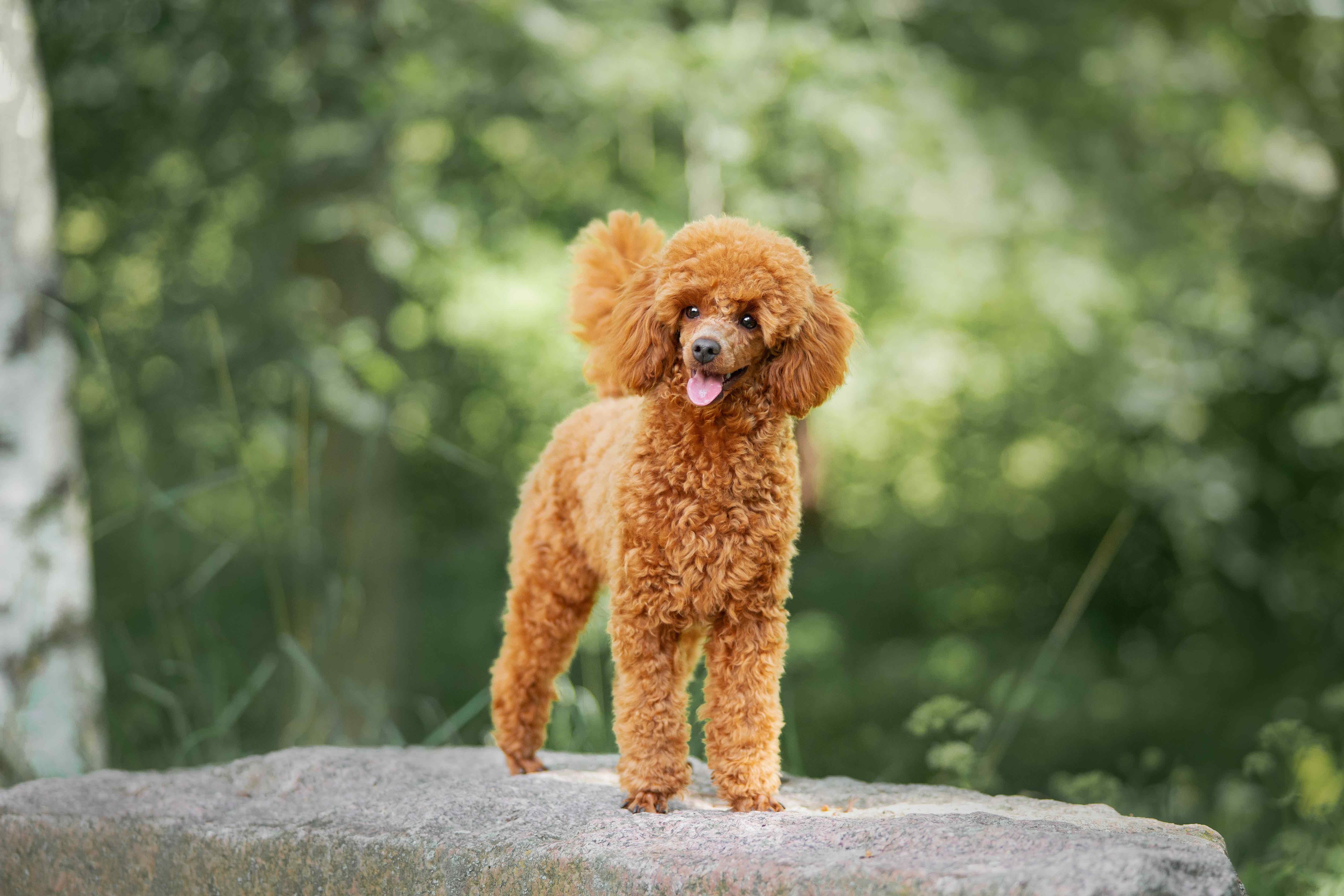
Miniature Poodles have a low-shedding coat, but just because they don’t really shed doesn’t mean they are a low-maintenance dog breed. They will need regular grooming to stay healthy, so you’ll either need to book regular appointments with a professional groomer or learn your way around dog clippers yourself.
Along with regular haircuts, Miniature Poodles also need their teeth kept clean. Brush their teeth with a dog-friendly toothpaste at least once a week, and schedule dental cleanings as your vet recommends.
Skin Care
Miniature Poodles should be brushed every day. Brushing keeps their coat clean and tangle-free, and keeps their skin healthy by removing dead skin cells and distributing natural oils.
These small Poodles should be bathed about once a month—and because they love water, bath time shouldn’t be a challenge.
Coat Care
Trimming your Poodle’s hair to a short coat will make grooming much easier. No matter how long you keep their curls, Miniature Poodles should go to the groomer every four to six weeks. You can also learn to groom your Poodle at home.
Eye Care
A Miniature Poodle’s hair can obstruct their vision if it grows long enough. You might need to clip the hair around their eyes between grooming appointments so your dog can see clearly and not have hair irritating their eyes.
Ear Care
Miniature Poodles love water, so keep their ears dry and healthy by cleaning them after all baths and swimming sessions. Otherwise, the moisture can become trapped and cause an ear infection.
Considerations for Pet Parents
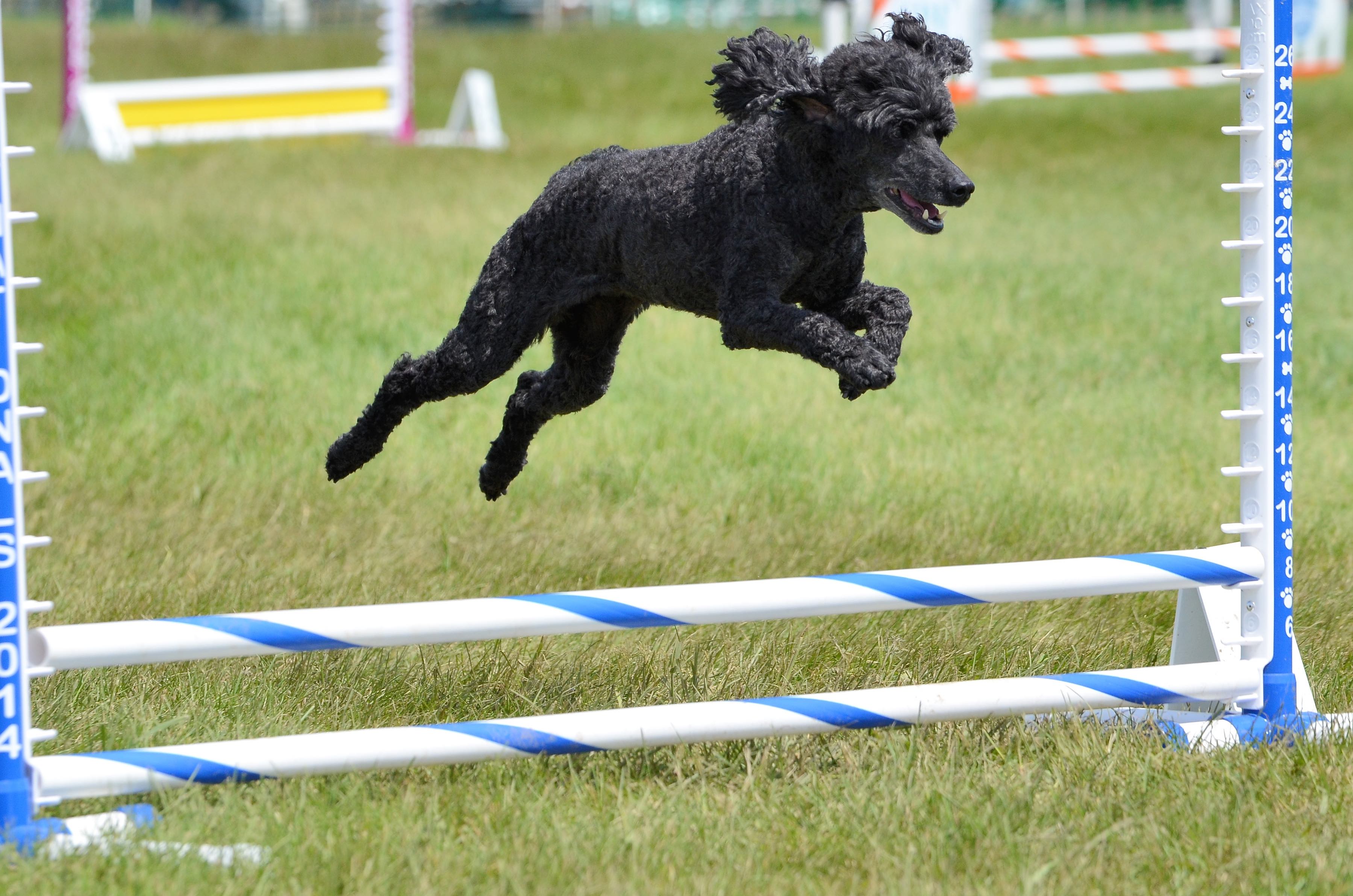
Smart and playful, Miniature Poodles can thrive in any home that gives them the attention and love they deserve. But because they need lots of playtime and mental stimulation to keep from becoming bored, they might not do well in a home where their family is away from the house most of the time. (That said, if you are busy, this small Poodle is easy to bring with you on errands.)
As long as they’re kept engaged, active, and well-groomed, Miniature Poodles will live happily.
Miniature Poodle FAQs
Are Miniature Poodles good pets?
Miniature Poodles are wonderful pets that are perfect for big families, singles, and people with other pets. Miniature Poodles are small, so they fit in well in any apartment or home. But they are also energetic and athletic, so you’ll need to keep up with their energy level.
Are Miniature Poodles hypoallergenic?
No dog breed is actually hypoallergenic. Yes, Miniature Poodles shed infrequently, but they still release allergens through their urine and saliva. That said, Miniature Poodles can be a good fit for people with allergies because of their low-shedding coat.
Before bringing home a Miniature Poodle puppy, spend time with the breed to see how your allergies react.
How big will a Miniature Poodle get?
The Miniature Poodle size when full-grown is typically 10–15 pounds and 10–15 inches tall.
Are Miniature Poodles high-maintenance?
Like all dogs, Miniature Poodles will need regular exercise, mental stimulation, and lots of love. Some might consider Miniature Poodles to be high-maintenance because of their coat, which needs professional grooming every four to six weeks.
